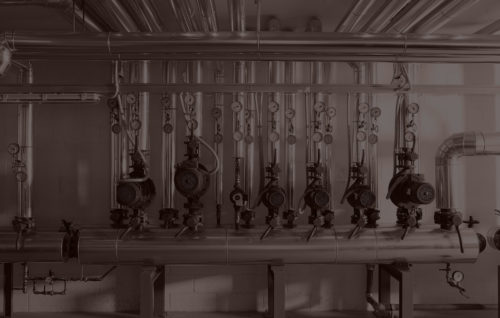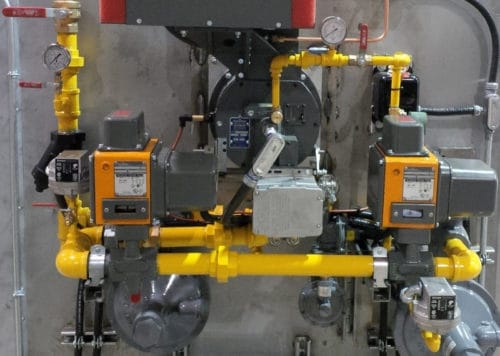Process heating systems provide the heat energy required for various manufacturing operations, such as heating, melting, curing, and drying. They generate this energy using one of four technologies: fuel-based, electricity-based, heat transfer media (steam, hot water, thermal fluid) and hybrid. All four technologies can transfer heat energy to the material directly or indirectly, depending on the design and configuration of the system. Direct process heating systems transfer the heat energy to the material itself, while indirect process heating systems utilize one or a combination of three thermal transfer mechanisms (conduction, convection, and radiative) to transfer the heat energy from the source to the material.
At Custom Thermal Applications, we specialize in the design, manufacture, installation, and retrofitting of combustion systems for industrial process heating applications. We produce these units in various designs and configurations to suit different industries and industrial applications, all of which are compliant with TSSA and CSA standards.
The following article provides an overview of the process heating systems we offer to help customers determine which one is right for their facility. Additionally, it outlines the general advantages and typical applications of process heating systems.
Types of Process Heating Systems
While process heating systems are available in fuel-based, electric-based, heat transfer media and hybrid variations, our company focuses on the design, build, installation, integration, and servicing of fuel-based—i.e., combustion-based—process heating units. These systems produce heat energy through the combustion of fuels (solid, liquid, or gaseous). They can transfer the heat energy directly by bringing the material into contact with the combustion gases or indirectly by integrating radiant surfaces between the combustion gases and the material or utilizing heat exchangers.
A properly design combustion system offers fuel-efficient production of usable heat energy for the intended application. Our experts have the knowledge and skills necessary to design and build reliable, safe, and efficient systems for virtually any heat processing application. Some of our product specialties include combustion burner systems, industrial water heaters, and industrial ovens/furnaces.
Combustion Burners
Combustion burners are key elements of combustion-related process heating technologies. They facilitate controlled combustion inside the system by combining fuel with air and igniting the mixture. This reaction generates heat energy, which is then controlled to achieve and maintain the combustion chamber temperatures needed for the specific process.
While all combustion burners follow the same basic operating principles, they come in a variety of designs to accommodate different industrial process heating applications. Some of the ways in which they vary include fuel capacity, mixing method, and dissemination mechanism. The four main types available are:
- Cold air burners: Cold air burners mix fuel with air at ambient temperature. They are used in everything from residential furnaces and heaters to large industrial furnaces and boilers.
- Hot air burners: Hot air burners use a central heat-exchanging mechanism to heat the air prior to combustion. They are generally utilized for high-temperature industrial operations.
- Regenerative burners:Regenerative burners operate in alternating pairs to achieve higher thermal efficiencies and lower emission rates. As one burner is firing, the exhaust gases pass through and preheat the other burner’s heat reservoir. When the other burner is fired, the combustion air passes through the preheated heat reservoir, allowing the exhaust gas energy to be recovered rather than wasted.
- Oxy-fuel burners:Oxy-fuel burners mix gaseous fuel with pure oxygen rather than air, which results in higher flame temperatures. They are a popular choice for industrial welding and metalworking applications.
Industrial Water Heaters
Industrial water heaters are ideal for applications that require hot water. Our QuikWater water heaters employ a direct heat transfer mechanism, known as direct contact water heating, by passing the supply water directly through the combustion gases to increase its temperature. Some of the key features of the system include:
- Stainless steel construction with no boiler tubes
- Single-pass heating up to 200° F from supply water as low as 32° F
- 99% thermal efficiency with corresponding emission levels and fuel savings
- Flow rates of 5 GPM to 2,300 (for single tower units) or more (for multiple tower units)
- Food industry approval
- Availability in low NOx packages (under 30 PPM, under 20 PPM, and under 12 PPM)
Compared to other water heating systems, direct contact water heaters offer the following benefits:
- Better water quality
- Higher thermal efficiency
- Faster heating speeds
- Greater output water temperature consistency (even during fluctuating or peak periods)
- Lower maintenance and replacement costs
Whether a customer requires our QuikWater water heaters or another water heater, our in-house engineering team can help them identify the design and configuration that best suits their needs. We can design, supply, build, install, startup, service, and support water heaters in single or twin tower configurations with capacities of 5 to 7,000 GPM and in sizes of 400,000 to 70,000,000 BTUH. Fuel options include fuel oil, propane, gas, and dual-fuel mixtures.
Industrial Furnaces and Ovens
Our experts can design, build, and install all types of oven and furnace systems for industrial and commercial applications. We can deliver ovens with 150° F to 500° F heating capacities and furnaces with 300° F to 2,500° F heat capacities. We can also upgrade existing oven and furnace systems with the latest improvements, such as PLC or fuel:air ratio control technology. Fuel options include fuel oil, natural gas, propane, and custom fuel mixtures.
Advantages of Process Heating Systems
When a process heating system is well-designed and properly matched to an application, it can provide the following benefits:
- Cost-effective operation: The right process heating system can optimize heat generation and transfer operations in the application, resulting in lower energy utilization, better processing efficiency, and/or higher product/process quality, all of which can reduce operating costs over time.
- Fast and easy installation: Well-designed process heating solutions effectively integrate heating and control systems into a single, all-inclusive unit. By partnering with a qualified and experienced process heating system provider, equipment can be designed according to the needs of the space and assembled for quick, trouble-free installation at the site.
- Single point of control:Process heating systems with integrated temperature sensors, remote controls, and other advanced instrumentation allow for enhanced management over system operation.
Industrial Applications of Process Heating Systems
Combustion-related process heating equipment finds application in a wide range of industries and industrial processes, including, but not limited to, the following:
- In the automotive industry: parts cleaning and coating systems and paint drying lines
- In the food processing industry: process ovens for bakeries and process cooking and water heating equipment for meat processors and other food manufacturers
- In the metallurgical industry: heat treating and burn-off ovens and thermal oxidizers
Some of the other industries that benefit from process heating systems include:
- Agriculture
- Appliances
- Computer Chip Manufacturing
- Cosmetics
- Electronics
- Medical
- Paint/Coating
- Paper
- Ship Building
- Textiles
Process Heating Systems at Custom Thermal Applications
Process heating systems play an integral role in meeting the process heating requirements of numerous industries. Identifying the best possible process heating solution for an application and knowing how to properly control and maintain it is critical to a successful operation. With this in mind, the experts at Custom Thermal Applications work with customers to engineer systems that are easy to maintain, long-lasting, and capable of achieving exceptional levels of efficiency within the application.
By choosing Custom Thermal Applications as your process heating solution provider, you benefit from over 30 years of experience in process heating system design, engineering, and manufacturing. With our comprehensive in-house engineering and testing capabilities, we can assemble and optimize combustion process heating equipment with integrated control systems to satisfy a range of operational requirements. We can also retrofit or upgrade existing systems to enhance their performance or make them CSA- and TSSA-compliant.
To learn more about our process heating system capabilities, contact us or request a quote today.




